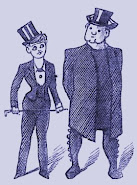
A list of serials in the course of publication in penny and halfpenny weekly parts was listed in the Examiner during one week beginning January 2, 1864. The titles were Red-Handed Hugh; or, the Heir of Osmond Hall, The Man in Gray “by the author of The Woman in Black,” Sea-Drift; or, The Wreckers of the Channel, The Basilik’s Eye; Deeds of Darkness; or a Fight Against Fate, The Smuggler Chieftain; or, The Witch of Eccleston Moor, The Gipsey Buccaneer; or, Secret of the Sea, Claude Duval; or, The Dashing Highwayman, Gentleman Clifford and his White Mare Brilliant, or, the Ladies Highwayman, The Hunted Felon; or, a Wife’s Vengeance, “by the author of The Murdered Wife,” Oscar Bertrand, “by the author of The Black Band,” Cartouche; or, The Noble Highwayman, The Queen of Night; or, The Secret of the Red Lodge, Isabel’s Vengeance, a Romance of London Life, The Mysteries of Merlin’s Cave “by the author of Leonora; or, Crime of the Deepest Dye,” The Daughter of Midnight “by the author of Ruth the Betrayer ; or, the Female Spy,” Mazeppa; or, The Dwarf’s Revenge, Philip’s Revenge, a Story of a Lone Island, Sixteen-Stringed Jack; or, The Daring Highwayman, The New Mysteries of London (with illustrations by Phiz), The Women of London , Jenny Diver; or, The Lady Highwayman, Nan Darrell; or, The Highwayman’s Daughter, The Red Chamber, Confessions of a Ticket-of-Leave Man , Black Bess; or, The Knight of the Road, Jessie, the Mormon’s Daughter, The Ghost’s Secret, a Tale of Terror, Blueskin, the only Romance giving the full adventures of Jonathan Wild and Jack Sheppard , and New Newgate Calendar, containing the Remarkable Lives and Trials of Notorious Criminals Past and Present.
This list is remarkable for containing no penny dreadful works published by the Newsagent’s Publishing Company, which is generally believed to have begun publishing in 1861 or 1862, except for Work Girls of London, usually dated 1865, and Confessions of a Ticket-of-Leave Man.
The stage melodrama and the penny dreadful had a symbiotic relationship, one catchpenny operation feeding off the other from the early 1830’s. The melodrama could be considered the equivalent of the modern cinema matinees while the penny dread was replaced by the pulps and comic books of the modern age. England’s popular heroes Jack Sheppard, Blueskin, Dick Turpin, the Blue Dwarf, Charley Wag and Spring-Heeled Jack all vaulted from the penny part to the theatre stage.
The woodcuts used on melodrama advertisements, posters and bills were borrowed from penny dreadful publishers. Frederick Wilton’s Britannia Diaries entry, for Wednesday August 12, 1863, read;
“To Mr. Dicks Publishing Office, 313 Strand, to get woodcut from Reynolds’s Miscellany for Ticket of Leave - lent grudgingly. Also to Ransom & Warren’s, 3, Bouverie Street, Fleet Street to get woodcuts from their Confessions of a Ticket of Leave - great difficulty to find Mr. Ransom, who when found, freely gave note to Printer for it. Block gone from Printers to Engravers - & Mr. R brought it himself to Theatre at night.”
Deeds of Darkness; or a Fight Against Fate was the title of a version of Ticket-of-Leave as published in Reynolds’s Miscellany. The serial was written by Charles Henry Ross and was published in penny numbers as well. Ransom & Warren are an unknown; Wilton may be referring to Henry Lea’s version of Ticket of Leave or the NPC version. The melodrama of The Work Girls of London followed on December 19, 1864, then a lull in dramatized NPC titles until Sept. 19, 1866 with Wild Boys of London and December 5, 1866 with Roving Jack, the Pirate Hunter. “Plenty of Woodcuts borrowed from Mr. Brett,” notes Wilton.
John Dicks indifferent attitude to lending woodcuts may have led to The Britannia turning to Edwin Brett and the Newsagent’s Publishing Company and Brett’s “boys of England” serials for much material in the 1860’s. Brett was probably still involved with the NPC during the period he started his numerous boy’s journals since Wilton’s diaries list a mixture of Boys of England and NPC serials in rotation. On November 27, 1866 Brett took over publication of The Boys of England which supplied raw material for a number of Britannia melodramas. Wildfire Ned; or, The Skeleton Crew appeared on December 19, 1866, Moonlight Jack by dramatist William Travers on June 19, 1867, and Wild Will; or, the Pirates of the Thames on Sept. 16, 1868.
*1864 The Work Girls of London; their Trials and Temptations London: Newsagents’ Publishing Company, 147 Fleet Street. Illustrated by Harry Maguire and Robert Prowse.
**The Britannia Diaries, 1863-1875: selections from the diaries of Frederick C. Wilton London: Society for Theatre Research, 1992.
















I knew there were lots of these penny dreadfuls published, but if there were this many in print in a single week--!
ReplyDeleteDid the dreadful publishers (or the theaters, for that matter) pirate each others' work all the time, like the dime novel publishers in the States? And by the way, what is a "ticket-of-leave man," anyway?
A "ticket-of-leave man" was a convict on parole and the story began life as a melodrama by Tom Taylor featuring the first detective on stage. The story was adapted for various serials in 8 page penny parts. I'm not sure if the melodrama was pirated or not. I have never found any accounts of lawsuits against pd publishers and the Victorians were quick with a lawsuit where money was involved.
ReplyDelete